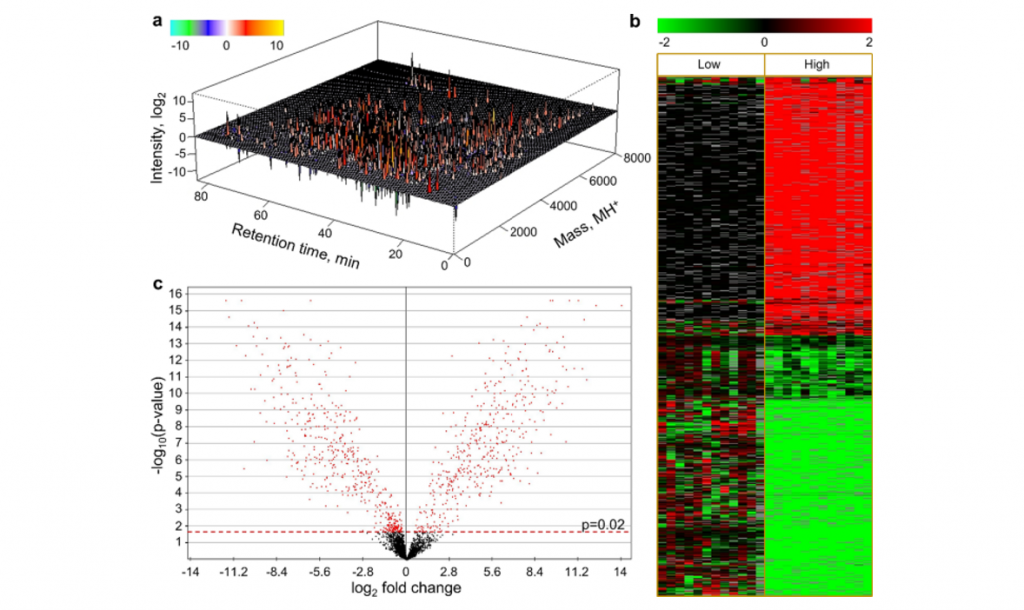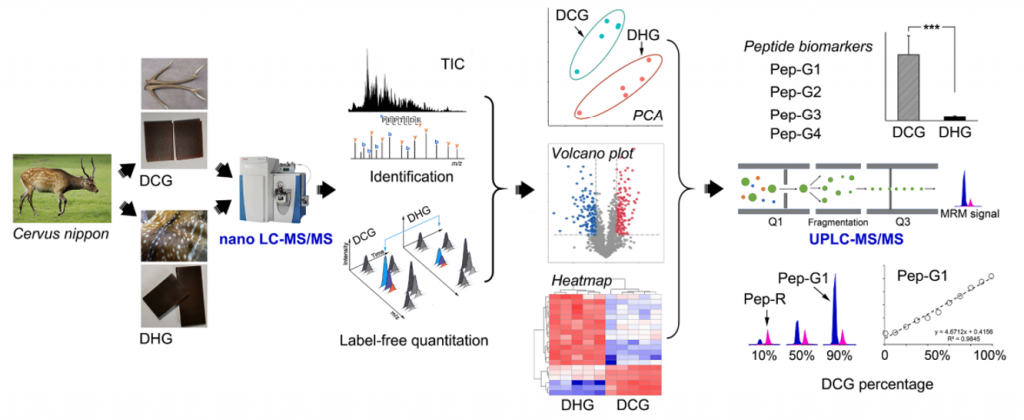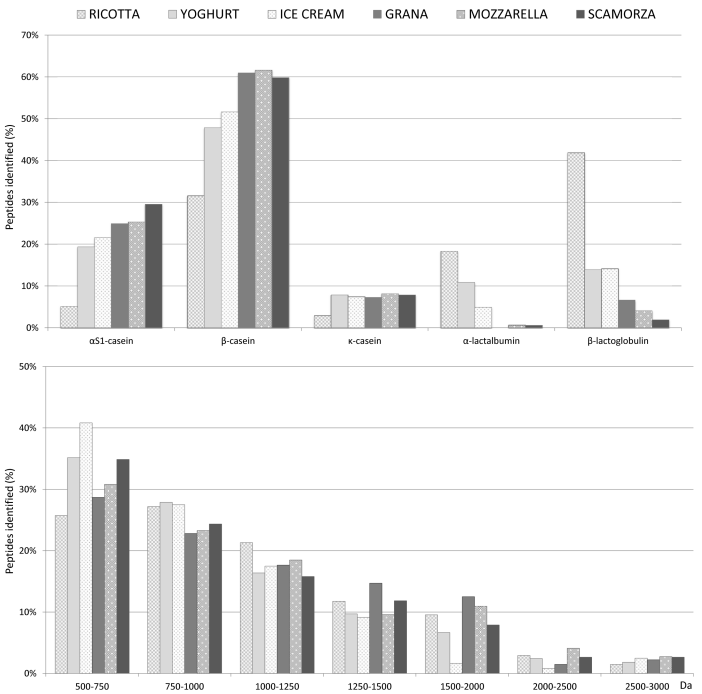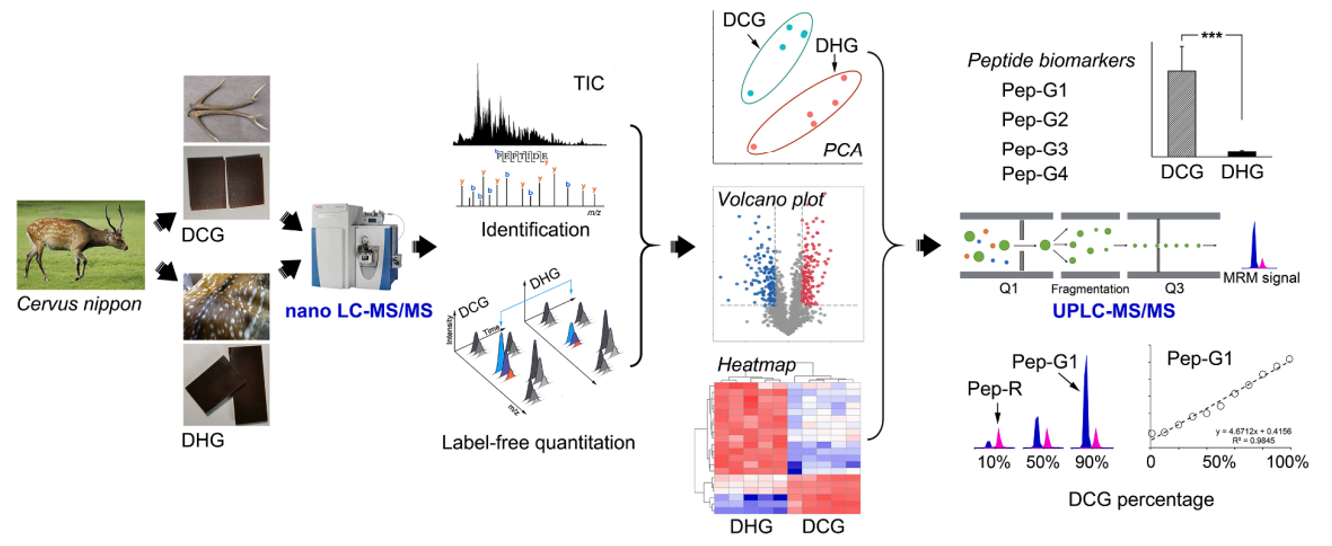Peptides are a class of chemical substances composed of amino acids that are commonly found in living organisms. To date, tens of thousands of peptides have been found in living organisms, and they have a wide range of physiological activities. Peptides are closely related to cell differentiation, neurotransmitter regulation, immune regulation and physiopathological processes such as tumor lesions in the activities of living organisms. Peptidomics takes endogenous peptides and low-molecular-weight proteins as the object of research, and studies the structure, function, change pattern of peptidomics and its related relationship.
Case Studies
Case 1: Peptidomics for biomarker study
Title: Serum peptidome: diagnostic window into pathogenic processes following occupational exposure to carbon nanomaterials
Year: 2021.10
Journal: Part Fibre Toxicol
Impact factor: IF=9.4
Study description: Carbon nanotubes and nanofibers (CNT/F) produce pulmonary, cardiovascular, and other toxic effects in humans or animals, causing the release of large amounts of biologically active peptides into the circulation and enhancing the serum peptidome.The subclinical effects of CNT/F may lead to chronic diseases, thus requiring sharp diagnostic markers of health outcomes. This study assessed the biomarker potential of the serum peptidome in detecting the subsymptomatic pathobiology of CNT/F workers using DIA technology, and the top ranked peptides were evaluated for sequence identification and pathological relevance. The findings provide a diagnostic basis for subsymptomatic pathology in CNT/F exposed workers and are used for longitudinal monitoring of systemic health risks.

The serum peptidome discriminated workers with acute CNT/F exposure.
Case 2: Peptidomics for drug authenticity identification
Title: Discovery of peptide biomarkers by label-free peptidomics for discrimination of horn gelatin and hide gelatin from Cervus nippon Temminck
Year: 2021.6
Journal: Food Chem
Impact factor: IF=7.514
Study description: Deer antler gelatin (DCG) is an expensive gelatin food, and adulterators often add cheap deer skin gelatin (DHG). However, there is no effective method that can distinguish DCG from DHG. In this study, label-free peptidomics was used by nanoLC-MS/MS to discover peptide biomarkers that were used to distinguish DCG from DHG. multivariate statistical analysis was applied in combination with glycosylation site analysis of peptides and to visualize the differences between DCG and DHG. Peptide biomarkers used to distinguish DCG from DHG were identified and validated by UPLC-MS/MS and MRM modes, and this module was used to calculate the percentage of adulteration in commercial samples. This strategy facilitates in-depth differentiation of food gelatin from different tissues of the same species.

Analytical scheme for peptide biomarkers identification in DCG and DHG.
Case 3: Peptidomics for dairy research
Title: Peptidome profiles and bioactivity elucidation of buffalo-milk dairy products after gastrointestinal digestion
Year: 2018.3
Journal: Food Research International
Impact factor: IF=4.972
Study description: Buffalo milk has higher total solids, fat (7-8%) and protein (4.2-4.5%) content compared to cow's milk (average fat and protein content of 3.9% and 3.2%, respectively). Buffalo milk also contains less cholesterol and more tocopherols and vitamin A than cow's milk. Many studies have focused on peptides released from a single buffalo protein, and no comprehensive study has ever been conducted on buffalo milk commercial dairy products. In this study, buffalo milk dairy products were investigated using peptidomic techniques. Six buffalo milk dairy products (Grana, Ice Cream, Mozzarella, Ricotta, Scamorza,Yoghurt) were subjected to in vitro simulated gastrointestinal digestion. The isolated peptide digests were characterized by high resolution mass spectrometry and evaluated for specific bioactivity. This research could drive the discovery of new active compounds in the pharmaceutical sector and the dairy industry to use buffalo milk as a functional matrix for health-enhancing products.

With advanced research platform, rich research experience, standardized service process and strict quality control system, Creative Proteomics can provide one-stop peptidomics services and professional data analysis solutions.
References
1. Mostovenko, E., Dahm, M. M., et al. (2021). Serum peptidome: diagnostic window into pathogenic processes following occupational exposure to carbon nanomaterials. Particle and Fibre Toxicology, 18(1), 1-16.
2. Han, S., Zhao, K., et al. (2021). oDiscovery of peptide biomarkers by label-free peptidomics for discrimination of horn gelatin and hide gelatin from Cervus nippon Temminck. Food Chemistry, 130347.
